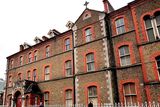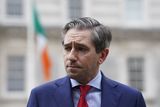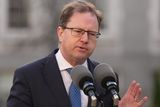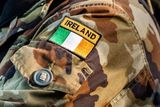Social media vetting for J1 visas causing ‘deep concern, confusion’ as Tánaiste says he will raise issue with US ambassador
Can your social media posts stop you getting into the United States?
Tánaiste Simon Harris has said he is “very concerned” about the updated advice from the US State Department, which requires all students applying for J1 visas to make their social media accounts public so they can be vetted by US authorities.
It comes after Taoiseach Micheál Martin described the new rules as "excessive" as he said the new rules contribute to “the fear and the anxiety that young people will now experience travelling”.
While Mr Harris acknowledged that US immigration policy is “a matter for the US authorities”, he said the decision has caused “deep concern, confusion and apprehension” for young people travelling.
He said he will raise the issue with the new US ambassador to Ireland, while officials at the Department of Foreign Affairs have been asked to “engage directly with the US embassy here in Dublin and with the administration more widely” to seek clarity.
The US Embassy announced yesterday that all those applying for visas must provide all social media accounts they have used in the past five years and make them public so they can be vetted by US authorities.
Failure to do so could lead to a visa being rejected and ineligibility for future visas.
In a statement issued this morning, Mr Harris said his officials will seek clarity on the new arrangements from the US embassy and the administration and he will raise the issue with the new US ambassador to Ireland next month.
“While US immigration policy is a matter for the US authorities and I fully respect the administration's right to determine their own immigration policy, this decision has understandably caused deep concern, confusion and apprehension for young Irish people who may wish to travel to the United States,” he said.
“Our relationship with the United States is deep and enduring. Importantly it also sees thousands of people travel in both directions every year. The intergenerational, people-to-people relationship between the US and Ireland begins with the opportunities that both countries afford to young people. It is important that we work to protect this.”
He said his officials were last night asked to “engage directly with the US embassy here in Dublin and with the administration more widely in a bid to ascertain and provide as much clarity as possible about these new arrangements, particularly to those students who are due to travel in the coming months”.
"I also asked my officials to engage with third-level institutions and organisations that provide services for students who wish to travel with the United States,” he added.
"This will be with the clear aim of providing as much clarity as possible on the impact of these new arrangements, relevant guidance and furthermore assessing what possible supports can be provided to young people who wish to travel to the United States in the coming months.”
Mr Harris said he will also raise the matter with the new US ambassador to Ireland when he formally takes up his post this month.
Speaking yesterday, Mr Martin said: "I believe those measures by the United States are excessive. I don't approve of them. I don't agree with them.”
There is an issue around freedom of speech, but it's more the atmosphere that's created by these measures, the fear and the anxiety that young people will now experience travelling," the Taoiseach said.
Though Mr Martin said he understood the importance of security, he believed the newly announced measures went too far.
Join the Irish Independent WhatsApp channel
Stay up to date with all the latest news















